Step into the realm of Floating Hotels where luxury meets the soothing embrace of the ocean, offering a distinctive harmony of opulence and coastal tranquility
Floating hotels are waterborne accommodations designed to provide a unique lodging experience by being situated on bodies of water, such as oceans, rivers, or lakes. Often referred to as Flotels.
Over the past decade, floating hotels have surged in popularity, offering an alternative to traditional land-based accommodations. The appeal lies in the novelty of staying directly on the water, providing guests with a distinctive and memorable experience.
Oceanic accommodations offer breathtaking views, allowing guests to wake up to serene sunrises or enjoy stunning sunsets over the water. The gentle rocking motion of the floating hotels adds a soothing element, creating a unique and calming atmosphere. There is a sense of isolation from the bustling city life enhances the overall experience, providing a peaceful escape surrounded by nature.
For our adventurous readers aged 50 and over, consider combining the serenity of floating hotels with the thrill of venturesome travel, creating a perfect blend of relaxation and exploration.
Floating Hotel Designs
Architectural Innovations
These incredible floating hotels showcase cutting-edge architectural designs, often featuring sleek and modern structures that harmonize with their aquatic surroundings. Many designs incorporate adjustable or floating foundations, allowing the hotel to adapt to changing water levels and environmental conditions, in addition, innovations in construction materials and techniques ensure the structural integrity of these unique accommodations, providing a blend of aesthetic appeal and functionality.
Sustainable Features
Embracing eco-friendly practices, floating hotels frequently incorporate sustainable features such as solar panels, wind turbines, and water treatment systems, and some floating hotels are built with materials that have a low environmental impact, aiming to minimize their carbon footprint. By adopting green technologies and practices, these hotels not only provide a luxurious experience but also contribute to the preservation of the surrounding marine ecosystems.
Unique Room Designs
The hotels offer a variety of distinctive room designs, from overwater bungalows with glass floors to rooms that immerse guests in the surrounding aquatic environment, whereas the interior decor often reflects a nautical theme, incorporating elements like marine-inspired colors, furnishings, and artwork. Some floating hotels take creativity to the next level, featuring rooms with panoramic underwater views, providing guests with an immersive and enchanting experience beneath the water’s surface.
Popular Floating Hotels
6 Iconic Locations
Flotels have found homes in some of the world’s most breathtaking locations, including the Maldives, Bora Bora, and the Scandinavian fjords. The allure of staying in these iconic destinations enhances the overall appeal, offering guests a chance to experience luxury while surrounded by stunning natural beauty. Whether perched above crystal-clear lagoons or navigating through scenic waterways, these hotels redefine the concept of waterfront accommodation.
1. Soneva Jani
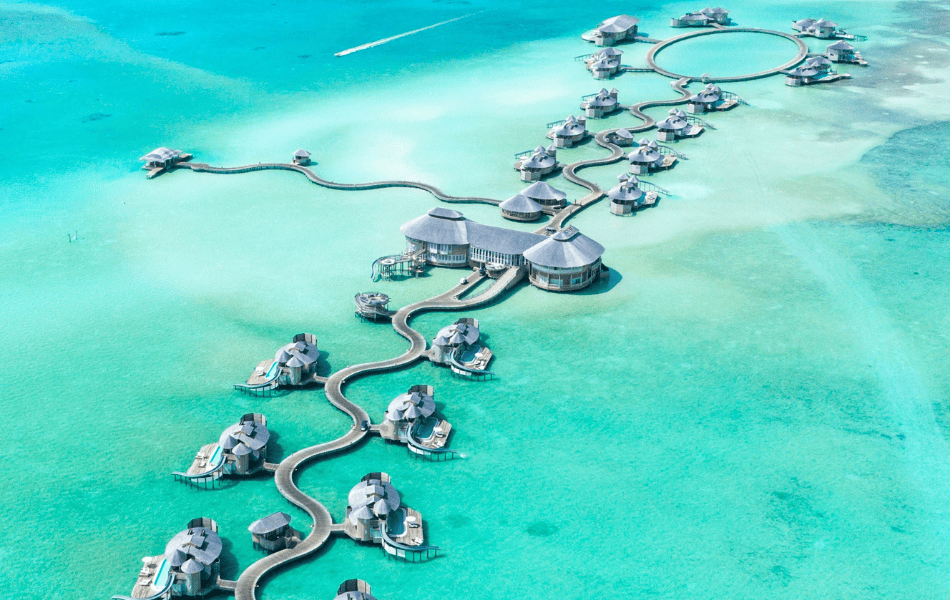
- Location: Maldives
Noteworthy Features: Overwater villas with retractable roofs for stargazing, private pools, water slides leading directly into the turquoise lagoon, and an underwater restaurant providing a unique dining experience. Link
2. The Manta Resort

- Location: Pemba Island, Tanzania
Noteworthy Features: The resort’s Underwater Room, submerged beneath the ocean’s surface, offers a 360-degree view of vibrant marine life. Guests can enjoy a three-level accommodation with the underwater bedroom being a truly immersive experience. Link
3. Song Saa Private Island
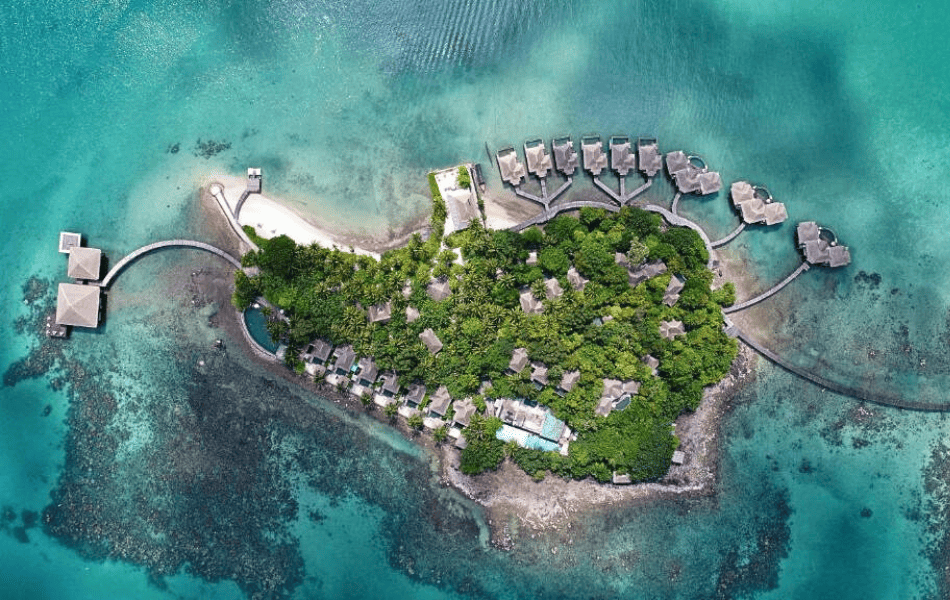
- Location: Cambodia
Noteworthy Features: Overwater villas designed with sustainable and reclaimed materials, private infinity pools, and direct access to the clear waters of the Gulf of Thailand. The resort is known for its commitment to environmental conservation. Link
4. Rosewood Mayakoba
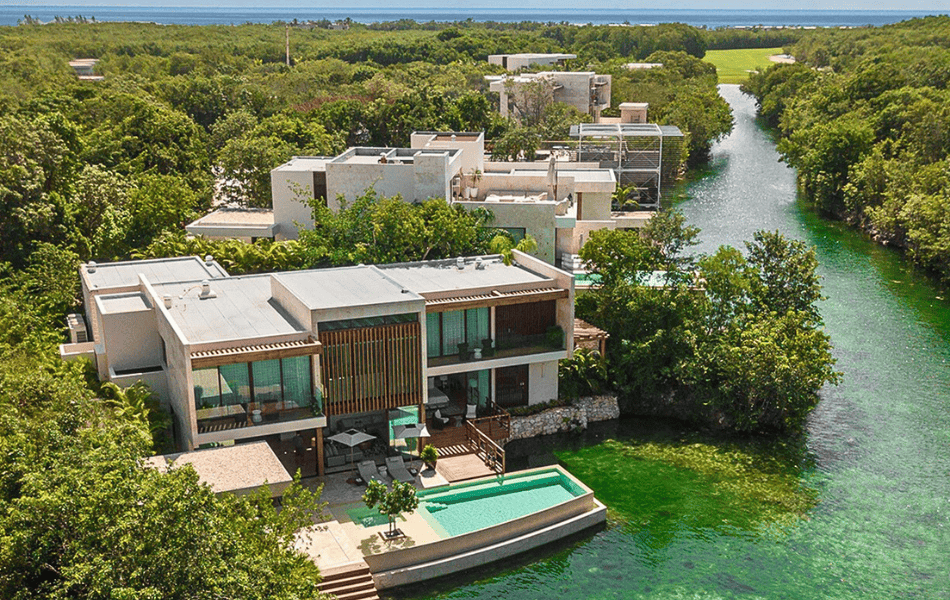
- Location: Playa del Carmen, Mexico
Noteworthy Features: The overwater lagoon suites provide a blend of luxury and nature. Guests can enjoy private plunge pools, outdoor rain showers, and stunning views of the surrounding mangroves. The resort also offers exclusive boat tours through the Mayakoba Lagoon system. Link
5. Gili Lankanfushi
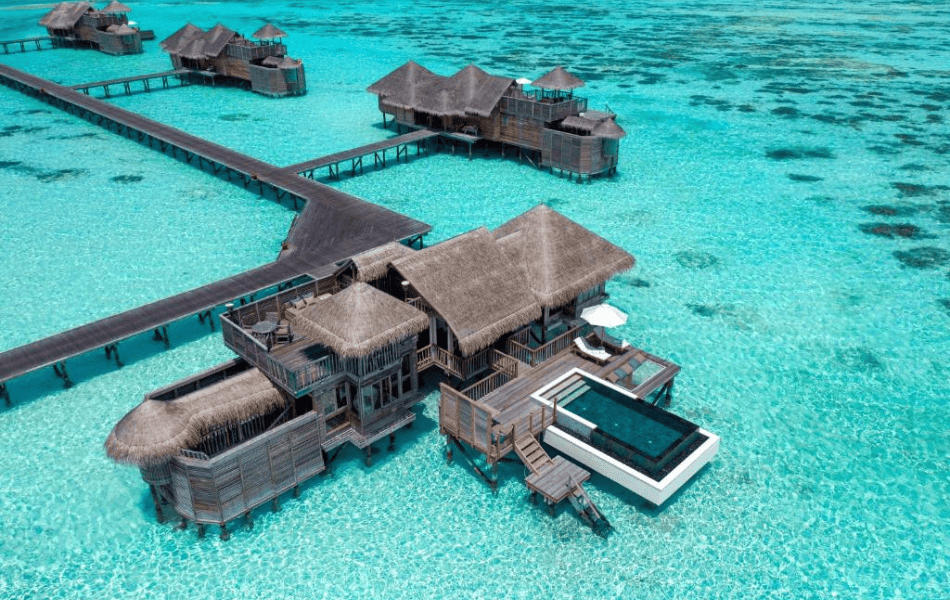
- Location: Maldives
Noteworthy Features: Luxurious overwater villas with direct access to the coral-rich house reef, spacious sun decks, and open-air living spaces. The resort is known for its eco-friendly initiatives, including a coral regeneration program and sustainable dining practices. Link
6. Sunborn London
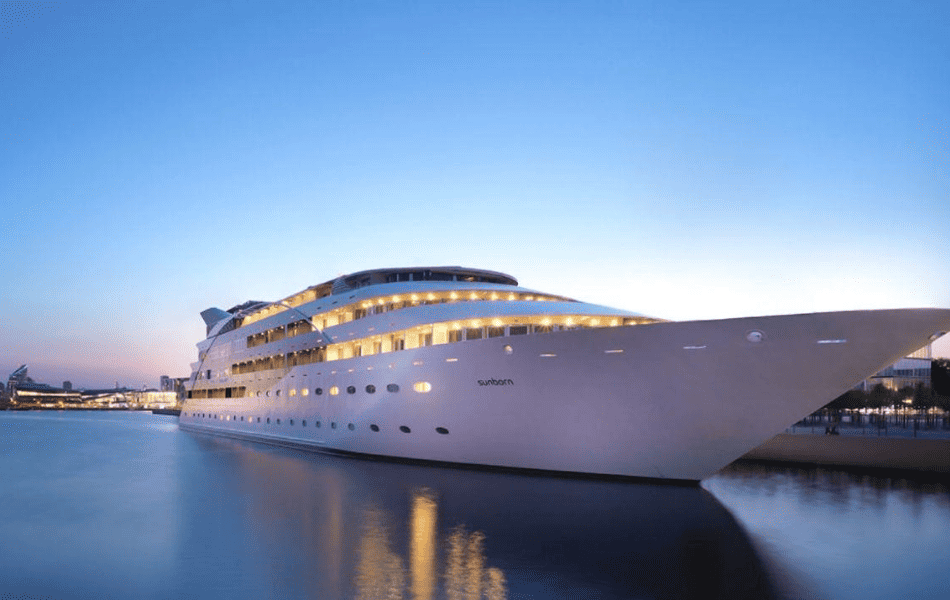
- Location: London, United Kingdom (Docked in Royal Victoria Dock)
Noteworthy Features: This luxury yacht hotel offers stylish rooms and suites with waterfront views. It features multiple dining options, a spa, and a stunning deck for relaxation. Sunborn London is known for its elegant design and the unique experience of staying on the water in the heart of the city. Link
Noteworthy Features
Many floating hotels boast impressive features, such as infinity pools that seemingly blend into the surrounding waters, providing guests with a surreal and visually stunning experience, furthermore unique dining options, including underwater restaurants and overwater dining platforms, contribute to the overall exclusivity and luxury of these accommodations. Some hotels incorporate underwater spas, glass-bottomed floors, and private decks, ensuring that guests enjoy unparalleled comfort and indulgence during their stay.
Guest Experiences
Staying in a floating hotel goes beyond luxurious amenities; it offers guests unparalleled experiences, such as snorkeling or diving directly from their accommodations and with that the intimate connection with nature allows guests to witness marine life from the comfort of their rooms, creating lasting memories. Personalized services, from private boat transfers to curated excursions, ensure that guests have a tailored and memorable stay, making these floating hotels sought-after destinations for those seeking an extraordinary escape.
Advantages of Floating Hotels
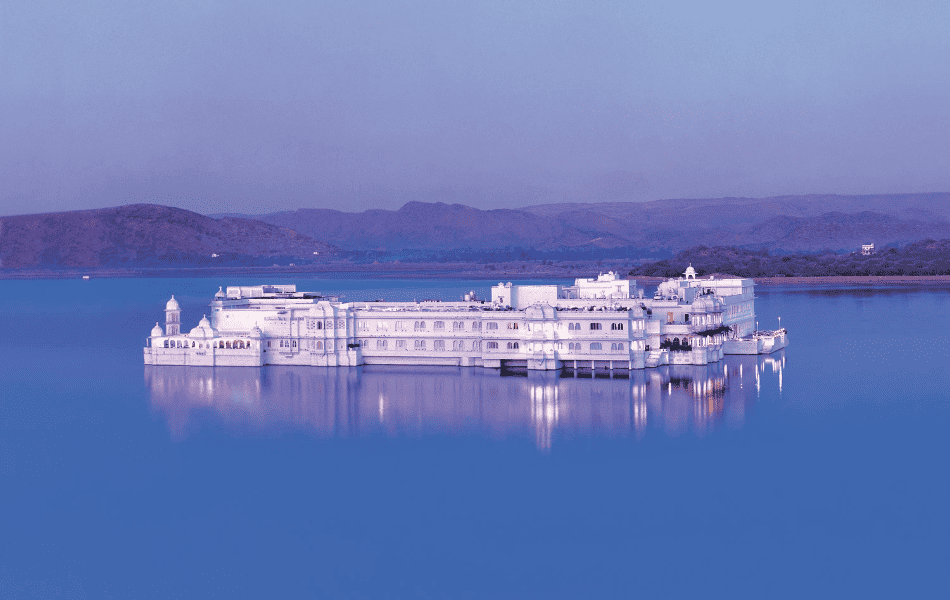
Scenic Views
– Unparalleled Vistas: Floating hotels offer guests breathtaking, uninterrupted views of the surrounding water bodies, whether it’s the vast expanse of the ocean, the tranquility of a lake, or the meandering flow of a river.
– Sunrise to Sunset: With rooms positioned directly over the water, guests can savor the beauty of nature from sunrise to sunset, creating a picturesque and ever-changing backdrop for their stay.
– Unique Perspectives: The elevated position of these hotels provides unique perspectives of the environment, allowing guests to feel intimately connected to the natural beauty that surrounds them.
Eco-Friendly Practices
– Sustainable Design: Many floating hotels prioritize eco-friendly practices in their construction, incorporating sustainable materials and innovative technologies to minimize their environmental impact.
– Renewable Energy: Some floating hotels harness renewable energy sources such as solar and wind power, contributing to a more sustainable and eco-conscious approach to hospitality.
– Preservation of Marine Life: By implementing responsible waste management and conservation efforts, floating hotels play a role in preserving the delicate marine ecosystems where they are situated.
Exclusive Atmosphere
Empowering solo female travelers will find solace and luxury in the safety of floating hotels, offering a unique, safe space for women solo travelers to embrace independence while surrounded by captivating seascapes.
– Tranquil Retreat: Floating hotels often provide a sense of seclusion and tranquility, creating an exclusive atmosphere that sets them apart from traditional land-based accommodations.
– Unique Accommodation: The distinctive nature of staying on the water fosters a sense of exclusivity, appealing to those seeking a one-of-a-kind experience that goes beyond standard hotel offerings.
– Personalized Service: The intimate setting allows for more personalized and attentive service, enhancing the overall guest experience and creating a memorable and exclusive retreat.
Challenges and Solutions
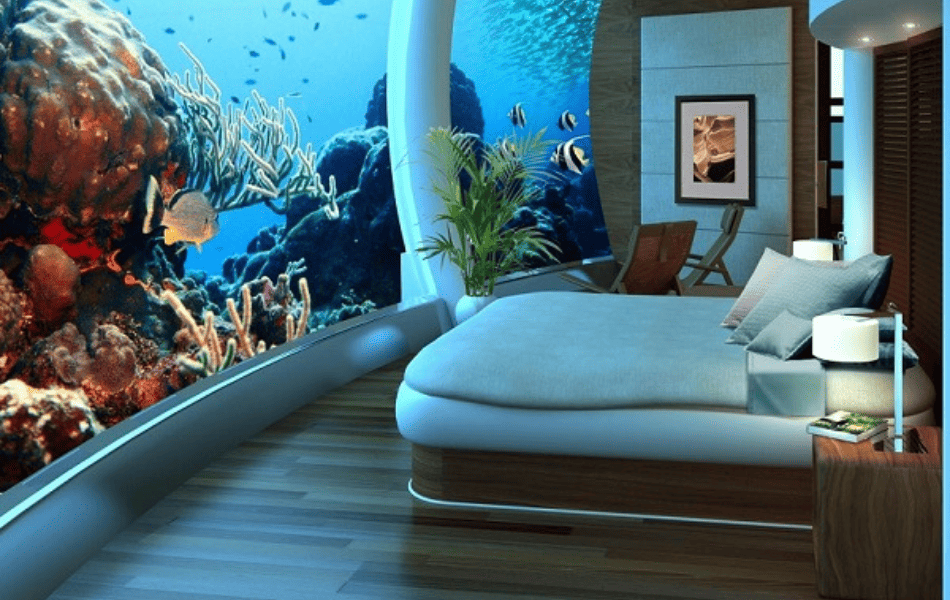
Engineering Challenges
Dynamic Environments
Floating hotels face engineering challenges due to the dynamic nature of water bodies, including tides, waves, and varying water levels. Engineers must design structures that can adapt to these changes without compromising stability.
Innovative Foundations
Constructing foundations capable of withstanding the forces of the water while maintaining structural integrity is a key challenge. Engineers often employ innovative foundation designs and materials to ensure stability in different aquatic conditions.
Weather Resilience
Floating hotels must be resilient to adverse weather conditions, such as storms and high winds. Engineering solutions involve designing structures that can withstand these challenges while ensuring the safety and comfort of guests.
Environmental Considerations
Ecosystem Impact
The placement and construction of floating hotels can impact local ecosystems. Environmental considerations include minimizing disturbance to marine life, avoiding damage to coral reefs, and implementing sustainable practices to reduce the ecological footprint.
Waste Management
Proper waste disposal and recycling on floating hotels present challenges, given their location on the water. Implementing effective waste management systems and eco-friendly practices are essential to mitigate the environmental impact.
Safety Measures
Emergency Evacuation
Ensuring the safety of guests in the event of an emergency, such as fire or structural issues, requires well-defined and practiced evacuation plans. Floating hotels must have clear procedures for safely moving guests from water-based accommodations to designated assembly points.
Waterborne Risks
Safety measures must address risks associated with being on the water, including the potential for guests to fall into the water. Design features such as sturdy railings, proper lighting, and safety protocols contribute to minimizing water-related risks.
Severe Weather Preparedness
Floating hotels need robust protocols for severe weather events. This includes monitoring weather forecasts, having emergency response plans in place, and providing guests with clear instructions to ensure their safety during adverse weather conditions.
Future Trends in Floating Hotels
Technological Integrations
- Smart Room Features: Future floating hotels are likely to incorporate advanced smart technologies, allowing guests to control room amenities, lighting, and climate through integrated systems.
- Virtual Reality Experiences: Technological advancements may bring immersive virtual reality experiences, enabling guests to explore underwater worlds or distant landscapes without leaving the comfort of their floating accommodations.
- Energy Efficiency: Continued technological innovation will lead to more energy-efficient floating hotels, with the integration of smart energy management systems, sustainable power sources, and eco-friendly technologies.
Expansion of Locations
- Urban Waterfronts: Floating hotels may increasingly appear in urban waterfronts, providing a novel and luxurious accommodation option in bustling city centers.
- Exploration of Remote Destinations: As technology allows for more sustainable and adaptable floating structures, hotels may venture into remote and pristine locations, offering guests exclusive access to untouched natural beauty.
- Cruise and Floating Hotel Combinations: The lines between traditional cruises and floating hotels may blur, with hybrid concepts that combine the best of both experiences, allowing guests to explore multiple destinations while enjoying the comforts of a floating hotel.
Evolving Guest Expectations
Discover the perfect synergy between rejuvenating wellness retreats and the tranquility of floating hotels, providing seniors with an idyllic setting for relaxation, self-care, and immersive natural experiences.
- Wellness and Sustainability: Future floating hotels are likely to prioritize wellness offerings, including spa facilities, fitness amenities, and health-focused dining options. Sustainability will remain a key focus to align with evolving guest preferences for eco-conscious travel.
- Customization and Personalization: Guests will expect more personalized experiences, from room customization options to tailor-made excursions. Floating hotels will likely invest in technologies and services that cater to individual preferences.
- Integration of Cultural Experiences: Floating hotels may incorporate elements of local culture and traditions, providing guests with immersive experiences that go beyond the physical structure of the hotel, creating a deeper connection with the destination.
Conclusion
In conclusion, floating hotels redefine luxury accommodations with their unique blend of scenic beauty, eco-conscious practices, and exclusive experiences. As they navigate future trends, incorporating technology, expanding to diverse locations, and meeting evolving guest expectations, these aquatic havens promise to continue captivating travelers seeking an extraordinary escape on the water.
Frequently Asked Questions

Question: “How are floating hotels constructed?”
- Answer: Floating hotels are typically constructed with innovative materials and foundation designs, allowing them to adapt to water dynamics, including tides and waves.
Question: “Are floating hotels safe during storms?”
- Answer: Yes, floating hotels incorporate robust safety measures, including weather-resistant structures and well-defined emergency evacuation plans, ensuring guest safety during adverse weather conditions.
Question: “What makes floating hotels eco-friendly?”
- Answer: Floating hotels often incorporate sustainable features such as renewable energy sources, eco-friendly construction materials, and responsible waste management practices to minimize their environmental impact.
Question: “Do floating hotels have Wi-Fi?”
- Answer: Yes, many floating hotels offer modern amenities, including Wi-Fi, ensuring guests can stay connected while enjoying the unique experience of staying on the water.
Question: “Can floating hotels be moved to different locations?”
- Answer: While some floating hotels are stationary, others, like houseboats or floating resorts, can be relocated to different locations, providing a versatile and dynamic accommodation option.
12 thoughts on “Floating Hotels: A Unique Blend of Luxury and Ocean Bliss”
Comments are closed.
Recent Posts
Discover Peartree Serviced Apartments Salisbury, once the Clovelly Hotel, a pet-friendly, stylish stay near the cathedral, station and Wiltshire’s top sights. Some places simply give you a bed...
Discover insider tips to find cheap flights from the UK, save on easyJet, Ryanair & BA, and score the best weekend and last-minute deals. Why You’re Paying Too Much for Flights Most UK...


Very interesting. Thank you.
Thank you James. Wonderful what is around us and can be discovered in our adventures.
Please tell me more about your excellent articles
Good day Hairstyles Trends. So pleased you are enjoying the articles. I write because I love to travel, appreciate different countries and experiences, and what I discover, I have to share to assist others in their journeys.
Thank you for writing this post. I like the subject too.
Thanks for posting. I really enjoyed reading it, especially because it addressed my problem. It helped me a lot and I hope it will help others too.
Thanks for posting. I really enjoyed reading it, especially because it addressed my problem. It helped me a lot and I hope it will help others too.
You helped me a lot by posting this article and I love what I’m learning.
May I request that you elaborate on that? Your posts have been extremely helpful to me. Thank you!
Please provide me with more details on the topic
Please tell me more about your excellent articles
Thanks for your help and for writing this post. It’s been great.